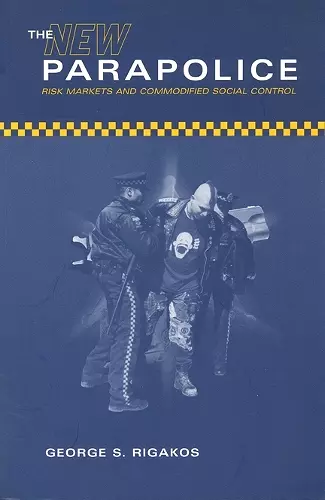The New Parapolice
Risk Markets and Commodified Social Control
Format:Hardback
Publisher:University of Toronto Press
Published:16th Feb '02
Currently unavailable, and unfortunately no date known when it will be back
This hardback is available in another edition too:
- Paperback£33.00(9780802084385)

'A pioneering observational study of private police and an original theoretical analysis of the profound transformations of policing in contemporary societies' -- Robert Reiner, Professor of Criminology, Department of Law, London School of Economics 'The research which George Rigakos reports in this study is both significant and timely. It is the most substantial ethnographic study of a contract private security company yet undertaken, which both updates and expands our understanding of the role and significance of such private policing providers, and their implications for the rapidly evolving character of urban policing in North America. His analysis and conclusions about these "new parapolice" are both interesting and important, and should be required reading for anyone with responsibility for, or simply an interest in, policing policy.' -- Philip Stenning, Centre of Criminology, University of Toronto 'This book breaks new ground in our struggle to understand how social control has become an increasingly sought after commodity in contemporary societies. Offering a sophisticated account of the political, economic and cultural forces at work in creating the "parapolice," Rigakos helps to deconstruct how threats, markets and organizational dynamics have reshaped the way we understand and respond to crime. Rigakos's analysis should prove especially valuable in mapping the new directions that social control will take in response to emerging threats, both real and imagined.' -- Steven Spitzer, Department of Sociology, Suffolk University
Rigakos argues that for-profit policing and security companies adopt many of the tactics and functions of the public police, and are less distinguishable from the latter than has been previously assumed in the criminological literature.
Policing in a capitalist economy is run on both state and private levels. Much existing literature on private policing assumes that the private sector is oriented almost exclusively towards loss prevention, and does not fulfil a crime-control function. In this carefully researched study, George Rigakos considers the increasingly important role of the 'parapolice' in the maintenance of social order. He argues that for-profit policing companies adopt many of the tactics and functions of the public police, and are less distinguishable from the latter than has been previously assumed in the criminological literature.
Rigakos conducted a detailed ethnographic and statistical case study of Intelligarde International - a well-known Canadian security firm - and uses his results to investigate the following: How are discipline and surveillance achieved organizationally and commodified as 'product'? How do security agents themselves, and those they police, resist social control?
This work offers wide-ranging theoretical implications, drawing on Foucauldian concepts such as risk, surveillance, and governmentality, and on Marxian formulations of commodity and aesthetic production. The first criminological ethnography of a contract security firm in Canada, this book will be of interest to criminologists, sociologists, lawyers, and policy-makers and to any non-academic reader with an interest in the experience of those employed in the parapolice.
ISBN: 9780802035622
Dimensions: 235mm x 157mm x 23mm
Weight: 430g
240 pages